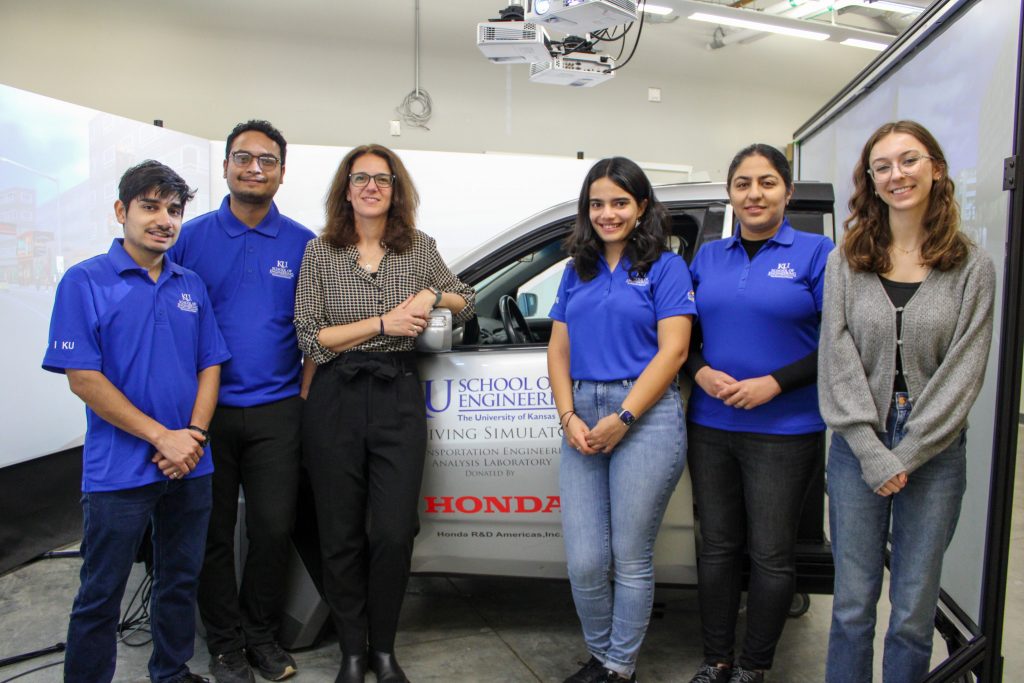By Ines Aviles-Spadoni, M.S., M.A., Research/Communications Coordinator, UFTI

Alexandra Kondyli, Ph.D., professor of transportation engineering at the University of Kansas (KU), has always been fascinated by how transportation influences how people move, live, and connect. That interest solidified toward the end of her undergraduate years, when she became interested in measuring and understanding the ever-changing way traffic flows.
“That curiosity, combined with a desire to contribute to research through improving mobility and safety, motivated me to pursue graduate studies in transportation engineering,” Kondyli said.
Her postgraduate journey began at The Pennsylvania State University, where she worked with her then master’s program adviser, Lily Elefteriadou, who is currently a professor of civil engineering in the UF Department of Civil and Coastal Engineering. Shortly thereafter, when her advisor accepted a faculty position at UF in 2004, Kondyli followed her – an experience that would go on to shape her career.
“I was fortunate that Lily and I were connected and she recruited me as her student,” Kondyli said. I was excited to join UF’s transportation engineering program, as its faculty are leaders in traffic management and operations, modeling and simulation research.”
Finishing her master’s degree at UF, Kondyli stayed on for her doctoral studies under Elefteriadou. Her dissertation focused on understanding how driver behavior and vehicle interactions affect traffic operations and how those interactions can lead to a breakdown in traffic flow – an area that allowed her to combine analytical modeling with real-world behaviors, and a topic she has continued to explore throughout her career.
“One of the findings I’m most proud of was identifying driver behavior patterns that contribute to the breakdown events,” she said. “This contributed to a better understanding of how certain roadway or operational conditions influence driver performance, and it helped open the doors to follow-up research and practical applications.”
Driver behavior is generally overlooked or assumed in traffic modeling, so Kondyli’s dissertation was innovative because she utilized focus groups, interviews, and field experiments to gain real-world insights from drivers.
Kondyli credits her success today to UF faculty members who, she says, were not only leaders in their respective fields but also very committed to mentoring. She says that Elefteriadou helped to shape, strengthen, and reinforce her research, analytical skills, and showed her how to balance big picture ideas with practical applications.
“Lily was and continues to be an exceptional mentor,” Kondyli said.
Both Elefteriadou and Scott Washburn, Ph.D., formerly a professor at UF and now a senior transportation engineer at WSB in Orlando, Florida, introduced her to the Transportation Research Board’s (TRB) Highway Capacity Committee. Elefteriadou encouraged Kondyli to attend the meetings, and Washburn later asked her to serve as a note taker – an opportunity that led her to become involved with the committee for multiple years.
Kondyli also credits Yafeng Yin, Ph.D., formerly at UF and now professor and chair of the Department of Civil and Environmental Engineering at the University of Michigan in Ann Arbor, along with Siva Srinivasan, Ph.D., professor in the UF Department of Civil Engineering and associate director of the UFTI, and Ruth Steiner, Ph.D., professor, UF Department of Urban and Regional Planning for expanding her knowledge in transportation engineering, systems, optimization, travel demand forecasting, and transportation planning.

“I consider all of them mentors for life,” Kondyli said.
Other mentors who have played an important role in her academic development include people she has met through collaborative research projects, conferences, and interdisciplinary work, she said.
The transportation engineering program at UF also provided Kondyli with a strong academic foundation in both methodological rigor and applied research.
“I learned how to design and execute research projects independently, communicate findings effectively, and collaborate across disciplines—all essential skills in my academic career,” she said. “The program also encouraged critical thinking and innovation, which helped me build a research agenda that has continued to evolve at KU.”
That’s why, for students interested in pursuing graduate school in transportation engineering, Kondyli encourages them to think about transportation’s interdisciplinary nature
“Branch out into other related fields, such as human factors, data science, or electrical engineering,” she said. I would also advise them to attend conferences, seek out mentors and gain hands-on experience.”
Eleven years after graduating from UF, Kondyli’s work at KU focuses on driver behavior, human factors, traffic operations, highway capacity, roadway safety, and simulation-based research. Her research group includes undergraduate and graduate students and postdoctoral scholars. She’s also worked on research projects at the local, state, and national levels funded by the U.S. Department of Transportation (USDOT), Federal Highway Administration (FHWA), the National Cooperative Highway Research Program (NCHRP), the National Science Foundation (NSF), and the Kansas Department of Transportation.
“My experiences at UF, working alongside Lily and the other professors, really shaped me into who I am as a professor and a mentor for my group,” Kondyli said. “I still seek advice from them, and I collaborate with them from time to time.”
